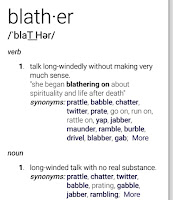A hiatus from Facebook?
A couple of days ago, I went into a convenience store. A clerk was telling another clerk, "today I'm going to do my annual Facebook check to see if I've missed anything for a year. Usually I never miss anything. I'll check it next year."
The same day, one of my therapists said, "every once in a while I deactivate my Facebook account because I get tired of everything and clear my head. I just want calmness in my life. I don't need to check in all the time."
I'm thinking about heeding that sage advice. Perhaps, I need some serenity without social media blather.
I get so tired of political rants and raves. I'm so tired of Obama, Hillary, and Trump apologists.
So called "Progressives" and "Conservatives" are all the same now: Condescending arrogant talking heads. Al Sharpton, Rachel Maddow, Rush Limgaugh, Bill O'Reilly, etc. are all the same.

I'm so amused and dismayed at the same time.
I just tired of patronizing social media gadflies.
So called "Progressives" and "Conservatives" are all the same now: Condescending arrogant talking heads. Al Sharpton, Rachel Maddow, Rush Limgaugh, Bill O'Reilly, etc. are all the same.

I'm so amused and dismayed at the same time.
I just tired of patronizing social media gadflies.
Therefore, I might pull the social media plug. I might let you know. Or not....


Comments